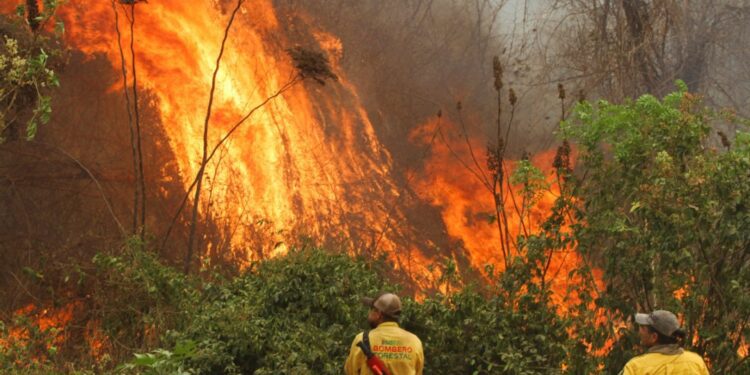Firefighters inspect an area affected by the wildfires in Concepcion, Bolivia, on Friday. [Photo/Agencies]
Wildfires in Bolivia are on track to set a record for the number of blazes this year, fueled by the destructive agricultural practice of land clearing through burning, and compounded by irregular rainfall patterns.
So far, the fires have destroyed more than 3 million hectares of rainforest, surpassing the devastation witnessed during the record-breaking fire season of 2010. They are not only decimating vast areas of rainforest but also shrouding cities such as Cochabamba and Santa Cruz in thick smoke, darkening the skies and raising concerns about respiratory health.
The fight against the fires is putting a strain on Bolivia”s limited resources, including a shortage of both firefighters and equipment.
Ludy Rudon, a firefighter working along a 100-kilometer fire line in the central region, emphasized the need for more manpower to control and extinguish the major blazes.
“The workdays are tough considering the length of the fire line, the heat, the wind and especially the type of fuel, which is very dense and tall,” Rudon said. “The rain helped very little because the density of the trees prevented the rain from reaching the ground — it was almost superficial.”
South America is currently at the peak of its fire season, but Bolivia has experienced an earlier outbreak because of drought. The country’s Defense Minister Edmundo Novillo announced emergency measures on Sept 7 to secure international support, adding to the 2,500 firefighters and 20 aircraft already deployed.
Wildfires across Latin America have grown increasingly severe in recent years.
“Farmers tend to clear and burn the vegetation to enrich the soil with nutrients,” said Erick Sossa Sanchez, an engineer and departmental director for Cochabamba at the National Meteorology and Hydrology Service. “Then, they plant … and harvest. Due to changes in the agricultural frontier, this (practice) has been increasing.”
Addressing this practice, known as chaqueo, may require legislative changes. Chaqueo involves burning vegetation before the rainy season to clear land for planting, with the ash enriching the soil. However, these fires frequently get out of control, causing massive destruction.
“Despite regulations prohibiting burning, many people ignored the warnings,” said Oswaldo Maillard, head of the Chiquitano Dry Forest Observatory. Wildfires have ravaged the Chiquitano forest in eastern Bolivia, destroying thousands of hectares.
John Zambrana Nogales, an agricultural engineer, said about 40 percent of forest fires occur on farmland, about one-fourth on public land or protected areas and 15 percent on indigenous lands.
Sanchez said the Bolivian Parliament should repeal lenient regulations on chaqueo to help curb the issue.
Source link : http://www.bing.com/news/apiclick.aspx?ref=FexRss&aid=&tid=66e8cb2a70d64ac09dcff15881650cb0&url=https%3A%2F%2Fwww.chinadaily.com.cn%2Fa%2F202409%2F17%2FWS66e8c6eea3103711928a83a5.html&c=18018280218584391508&mkt=en-us
Author :
Publish date : 2024-09-16 13:00:00
Copyright for syndicated content belongs to the linked Source.







